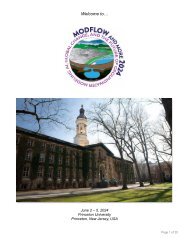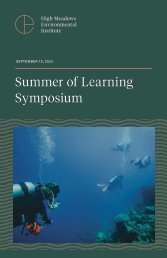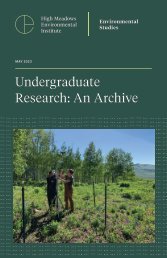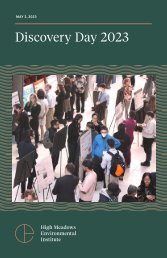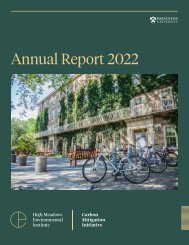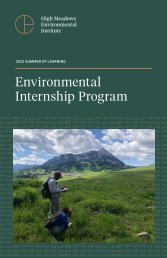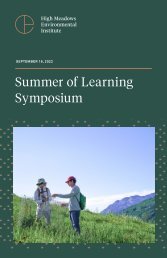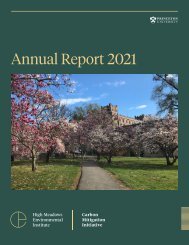Environmental Internship Program - 2023 Booklet
You also want an ePaper? Increase the reach of your titles
YUMPU automatically turns print PDFs into web optimized ePapers that Google loves.
OCEANS AND<br />
ATMOSPHERE<br />
Charlotte Merchant ’24<br />
COMPUTER SCIENCE<br />
Certificates: Applied and Computational<br />
Mathematics, Statistics and Machine Learning<br />
PROJECT TITLE<br />
Sensitivity Analysis of<br />
pCO 2<br />
Estimations and<br />
Code Migration for<br />
Enhanced Climate<br />
Modeling<br />
ORGANIZATION(S)<br />
Max Planck Institute<br />
for Meteorology<br />
LOCATION(S)<br />
Hamburg, Germany;<br />
Ostend, Belgium<br />
MENTOR(S)<br />
Peter Landschützer,<br />
Research Director,<br />
Flanders Marine Institute<br />
(VLIZ); Annika Jersild,<br />
Postdoctoral Researcher,<br />
Max Planck Institute for<br />
Meteorology<br />
I studied the influence of sea surface<br />
temperatures on the estimation of the<br />
partial pressure of carbon dioxide (pCO 2<br />
)<br />
globally. As a fundamental indicator of the<br />
ocean’s thermodynamic interactions, mixing<br />
phenomena, and air-sea interactions, sea<br />
surface temperature remains a key predictor of<br />
pCO 2<br />
in statistical, algorithmic and machine<br />
learning approaches. However, input sea surface<br />
temperature datasets are inconsistent across all<br />
pCO 2<br />
estimation methods due to differences in<br />
spatial and temporal focus, leading to sources<br />
combining different instrumental records<br />
and interpolation techniques. By evaluating<br />
the sensitivity of pCO 2<br />
predictions to different<br />
datasets, I aimed to distill the reliability of these<br />
estimations. In the program MATLAB, I used a<br />
previously described two-step neural network<br />
methodology for global pCO 2<br />
estimation. I also<br />
worked on migrating the MATLAB code into<br />
the program Python to enable execution within<br />
a high-performance computing environment.<br />
Engaging with an early implementation<br />
of machine learning in a climate science<br />
context motivated me to explore how other<br />
computational advancements can amplify the<br />
predictive capabilities of climate models. I also<br />
enjoyed the opportunity to engage in dynamic<br />
discussions with colleagues. The intellectually<br />
stimulating environment of the institute<br />
cemented my desire to pursue further study in<br />
climate computing.<br />
90




